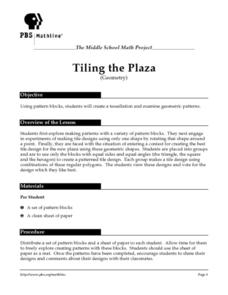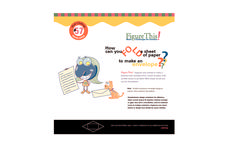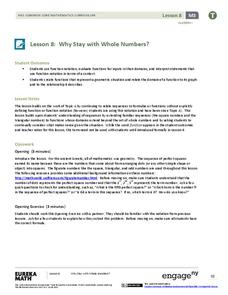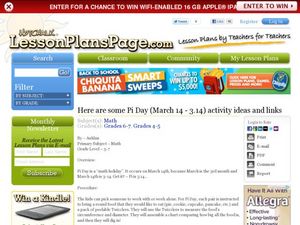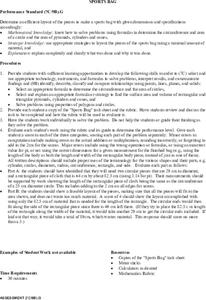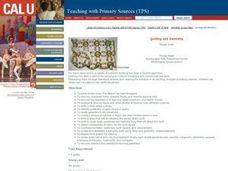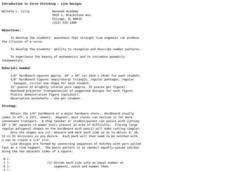Curated OER
Wardrobe
Sixth graders observe the wardrobe and discuss the role of the wardrobe in the culture of viceregal Mexico. They research the design and the influence of Moorish decoration in the geometric pattern on the door. Students identify...
Curated OER
Chessboard Challenge
Second graders read "The King's Chessboard" by David Birch. The teacher reads the story aloud and pauses at several points for students to calculate the next number in a pattern of doubling.
Curated OER
Tiling the Plaza (Geometry)
Middle schoolers make patterns with a variety of pattern blocks. Pupils experiment with making tile designs using only one shape by rotating that shape around a point. They enter a contest for creating the best tile design for the new...
Curated OER
Coil-Built Pueblo Bowls
Use Native American tradition to create the context for making different cultural representations of pottery. Practice using geometrical shapes painted on the pottery, research different patterns found on Native American pottery, and...
Curated OER
Math Challenges
Students engage their critical thinking skills to solve challenging math problems. In these problem solving lessons, student work with tessellations, weights/measurement, reasoning, surface area, geometric shapes, and algebraic procedures.
Curated OER
Perpendicular and Angle Bisectors
In this geometry worksheet, 10th graders solve problems that are based on the theorems associated with perpendicular and angle bisectors of a triangle. An application on the coordinate plane is included. The one page worksheet contains...
Curated OER
A Fine Mess
In this enthalpy and entropy worksheet, students read about the differences between enthalpy and entropy and answer three critical thinking questions about the reading.
Curated OER
Fold and Cut 2
Second graders make, name, and describe, using their own language and the language of geometry, everyday shapes and objects. They create and discuss geometric patterns which repeat (show translation), or which have rotational or...
Curated OER
Tessellating Tiles
Second graders Make, name and describe, using their own language and the language of geometry, everyday shapes and objects. They create and talk about geometric patterns which repeat (show translation), or which have rotational or...
EngageNY
Recursive Formulas for Sequences
Provide Algebra I learners with a logical approach to making connections between the types of sequences and formulas with a instructional activity that uses what class members know about explicit formulas to develop an understanding of...
EngageNY
Why Stay with Whole Numbers?
Domain can be a tricky topic, especially when you relate it to context, but here is a lesson that provides concrete examples of discrete situations and those that are continuous. It also addresses where the input values should begin and...
Curated OER
"Pi" Day
Your class will complete research dealing with Pi and its value in mathematics, leading into a discovery lab to demonstrate Pi, how it is determined, and how it is used. In the end, learners eat PIE!
Mathematics Vision Project
Quadratic Equations
Through a variety of physical and theoretical situations, learners are led through the development of some of the deepest concepts in high school mathematics. Complex numbers, the fundamental theorem of algebra and rational exponents...
Curated OER
Make-Your-Own Math Practice
Students create their own math practice book. In these homemade book lessons, students create their own counting, number, and shape pages. When the pages are complete, they are bound together in a book.
Curated OER
Compatible numbers to 20
Learners practice theories dealing with equals sign used as a balance, inequality symbols and practice utilizing a box or some other geometric shape to represent an unknown number. They assess numeracy problems embedded in language-rick...
Curated OER
Symmetry: Theory, Reality and Art!
Students explore the concept of geometric symmetry. In this geometric symmetry lesson, students walk around their school and take pictures of objects that demonstrate symmetry. Students use Microsoft Paint to draw the lines of symmetry...
Curated OER
Sports Bag
Students determine an efficient layout of the pattern pieces needed to make a sports bag with given dimensions and specifications. Given a word problem, data set and a diagram, students evaluate the information they have available and...
Curated OER
How many edges do I need to cut in order to open a cube?
Students problem solve to open a cube to create different shapes. In this problem solving lesson plan, students are given a cube and the shapes to open it up to, and they have to cut the cube open to make certain shapes. This gives them...
Curated OER
Scenario Challenge
Students create a quilt, using different patterns. In this geometry instructional activity, students apply prior knowledge as they use different patterns to help them create a quilt using transformations and geometric shapes.
Curated OER
Geometry and Quilting
Students create a quilt square for a class quilt using at least three, two-dimensional geometric figures. They research and write a brief description of at least two different quilt patterns that they find. Pupils discuss that quilts are...
Curated OER
Sew, You Want To Quilt?
Students become familiar with the achievements of the artist Faith Ringgold. They take notice of the patterns in their environment. They connect the mathematical concept of patterns to create a class quilt.
Curated OER
Anything I Can Do You Can Do Better
Students complete a two-week unit involving design and construction concepts. They watch a PowerPoint presentation about geometric shapes, draw the fourteen shapes incorporated in bridge construction, and in small groups design, build,...
Curated OER
Introduction to Curve Stitching - Line Designs
Students develop their awareness that straight line segments can produce the illusion of a curve and helps them recognize and describe number patterns and geometric fundamentals.
Curated OER
Egg-streme Tesselation
Sixth graders view a video of tessellating an egg shape. They focus upon the problem solving strategies used and how tessellation geometry was used to construct the three dimensional figure. They create their own tiling patterns.




